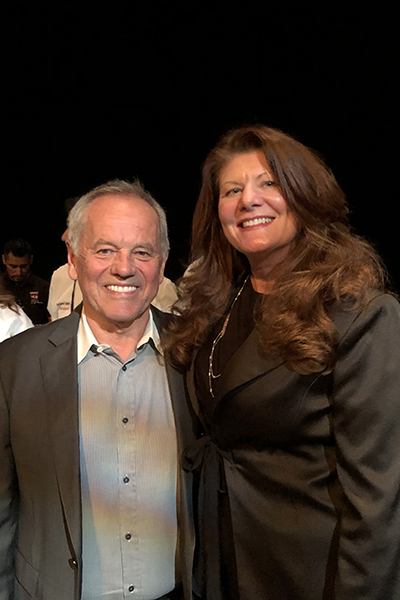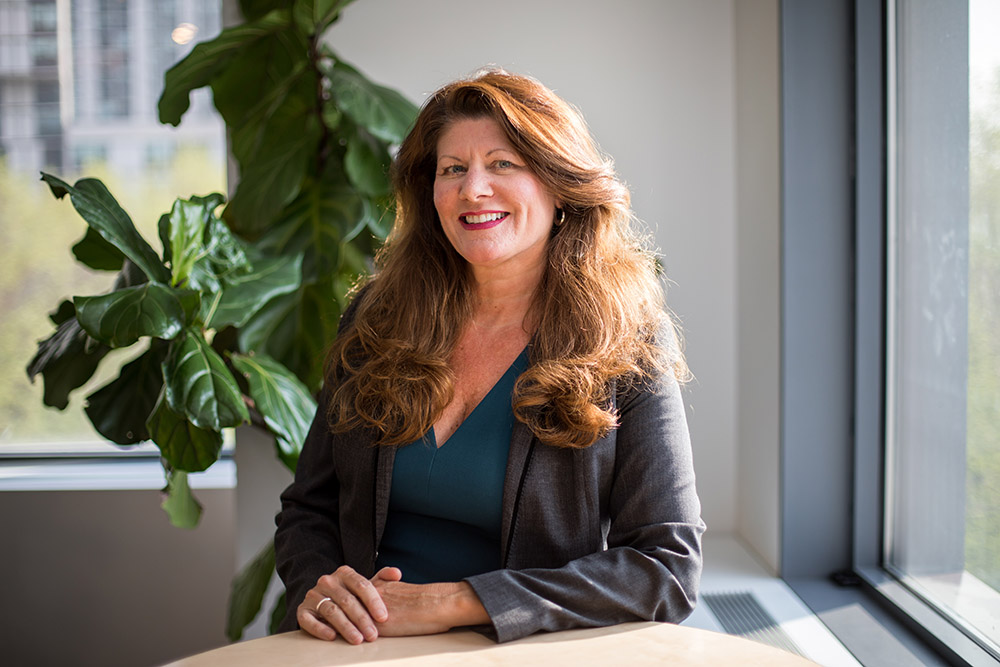Throughout her 15 years in the restaurant industry, Mishel LeDoux was a general manager at such renowned properties as CUT by Wolfgang Puck in the Beverly Wilshire hotel and The Bazaar by Jose Andres in the SLS Hotel and continues doing hospitality consulting.
Mishel began her restaurant career as a server, a job that fit with her college schedule, and quickly worked her way up by always having what she describes as “a passion for food, beverage and people.” Since joining the Institute of Culinary Education’s Los Angeles campus, she’s seen three classes graduate and stood alongside her mentor, Wolfgang Puck, at the campus’ first commencement ceremony, a career highlight.
How did you land your first job with the Wolfgang Puck Fine Dining Group?
I had waited tables before and had some experience, but I remember when they interviewed me, they asked if I knew what grape was in Chablis. I knew it was chardonnay and felt like I nailed the curve ball question they tried to throw at me. Getting a job at Spago in Palo Alto when it was opening was a big deal. I had to wait on a huge line just to have an interview. It was the perfect job for me as I didn’t have anyone supporting me through college and making great money via tips at Spago was a way to avoid taking out student loans.
How did you transition to management?
Once I was in the public relations program at San Jose State I needed to do an internship. I got a job at a PR and advertising firm in San Jose called Orloff Williams & Company and brought on Wolfgang Puck and Spago as my own client. Then the Wolfgang Puck executives made a position for me at Spago, where I became the special events manager and publicist for the restaurant and got Wolfgang on the morning shows in the Bay Area. It was a perfect position for me to still use some creativity and not just be a floor manager.
What do people need to put out there beyond the skills for promotions?
At that time, I was extremely driven, even in my role as a server. I always had a passion for food, beverage and people. I always went above and beyond to bring special moments to people and make them feel special, and I think that stood out.
What brought you to Los Angeles?
The Wolfgang Puck people came to me again and said we’re opening this new concept, CUT by Wolfgang Puck. It’s going to be an upscale steakhouse within the Beverly Wilshire, and we’d like to know if you’d like to move back down to SoCal. They envisioned me as the assistant general manager. I’d be closer to Wolfgang and we had a very good rapport. Again, by being driven, extending myself, doing as much as possible and learning as much as possible, I jumped from that position to the AGM of CUT by Wolfgang Puck.

It seems like the Wolfgang Puck Fine Dining Group recognizes and rewards talent.
Absolutely. I’ve seen a lot of line cooks go on to executive sous to executive chef within the Wolfgang Puck group and to executive chefs of their own concepts. If you work really hard and take on as much as you can with humility and a desire to grow, hopefully your hard work is recognized. Wolfgang has always been the kind of chef, restaurateur and owner that recognizes talent and brings people up within the company.
What did you learn that applies to your role in education now?
Teaching has brought me a lot of joy in giving back to the industry that has given me so much. I have students for about seven months, and I instill in them a lot of things that took me a long time, many years in the industry, to learn. I feel like I’m giving them this influx of information that they absorb and can use throughout their lives.
I’m sure you share moments where you had to think on your feet. What’s an example of one such time?
One time at CUT, we had a challenging group that was very late for their reservation. We seated them, even though it was past the 15-minute grace period. I said that I needed the table back by 7:30 p.m. in order to accommodate another reservation at 7:45 p.m., but when the time rolled around, they decided not to honor that acknowledgment. When I asked again if I could move them to another table because the next reservation was a large group and this was the only table that could accommodate that, they begrudgingly moved to another table. We moved them to a really comfortable booth, one of the most favorable tables, that they could have for the rest of the night, and we comped their desserts.
Ironically, when I was finally able to escort the 7:45 p.m. reservation to that larger table, the group consisted of Brad Pitt, Angelina Jolie, Matt Damon and his wife, George Clooney, and Jerry Weintraub and his wife. Basically the “Ocean’s Eleven” group. When the original table that had to move saw who everyone was in the party, they called me over and said, “why didn’t you just tell us who was coming in and we would’ve moved!” Unfortunately, I told them, my job is to be discreet and not to announce high-profile guests who are coming in. It was one of the most exciting times at CUT.
It has to get challenging with so many celebrities and VIP guests in Los Angeles.
It’s a lot of fun, too. When people ask me what celebrities I’ve met or taken care of, I say it’s probably easier for me to tell you who I haven’t met. That list is shorter! Some of the most amazing celebrities included David Beckham, Tom Cruise, Keanu Reeves, Sandra Bullock, Oprah Winfrey, Jay Z, Beyoncé, Prince, The Rolling Stones … I could go on and on. And I always kept my cool.
The management program discusses hot-button topics. What are some of the current events that you’ve covered recently?
We were recently debating online ordering and delivery apps – Postmates, Caviar, DoorDash and Uber Eats. We talked about how this is changing the industry and whether the impact is positive or negative. People have their theories. The delivery apps take such a high percentage and are the restaurants really making profit or is it just putting more stress on the restaurant? It’s an interesting concept to consider when opening your own business.
What’s a new restaurant concept that’s caught your attention?
I recently went to Uovo in Santa Monica, which has the same owner as Sugarfish. They have such an efficient way of producing pasta with machinery on timers and baskets that drop the pasta into the hot water. I love watching that. The business model is amazing because it is super-efficient and productivity is better, which I talk about with my students in terms of making sure to maximize your check average, hours of operation and how many turns you can get in. I noticed Uovo has six or seven of those baskets and as soon as the timer is up, they pop up and take the basket and dump the pasta into the saucepan, and then turn around like a bartender and plate it to the guest at the counter. It’s a streamlined way of getting hot plates to the guests. Our dining experience was complete in 35 minutes: two pastas and an appetizer and a bottle of wine.
What do you think that says about the direction the industry is going?
Efficiency and productivity is how restaurants will survive. If they are able to produce a lot of food and get people in and out — it’s cost-effective and efficient. It’s the wave of the future.

What do you hope for your students’ futures and what do you want them to leave ICE with?
Whether they’re a business person, open a bar or lounge, have a food truck, open a pastry shop or a full-service restaurant, or find a position within an established restaurant group, I want them to leave here feeling like they understand how important it is to take care of the guest. That at the end of the day, taking care of the guest brings not only joy, but in business terms, that is the foundation that drives revenue.
The guest who returns, who you make feel cherished — that is priceless. It really is. A lot of people don’t see the value in that. One of the topics we talk about is openings and closings. Because the bottom line, the profits are so narrow for this industry, that if you don’t know the value of taking care of guests, you will never fill the seats and you will eventually close.
How do you interact with students?
These students mean the world to me. They text me and call me and want to meet with me and have a conversation or go to dinner, which has just been life-changing for me. The connection I have built with them is one that isn’t just as their teacher, I have hopefully become a mentor and somebody they can always contact. It’s an ongoing relationship that will continue over the years. It makes me very proud and almost maternal in sending them out to the world. And I love hearing back from them and hearing about their successes and all their achievements.
How would you sum up the culinary management program?
The Restaurant & Culinary Management program is essentially a journey of taking students through developing concepts to understanding purchasing, finance, P&L, marketing, social media, and basically at the end of it we complete a full business plan and students present that as their final project. Many of them have really been amazing and could be viable businesses that I hope to see down the road here in L.A. One day I’ll be sitting in my students’ restaurants, and I’ll be very proud.
What was it like having Wolfgang Puck as our first graduation commencement speaker?
It felt like my career had come full circle having Wolfgang Puck as our keynote speaker. To see the students flip off their hats and have Wolfgang standing there with me and taking photos with all of us, it was amazing. It made me feel very complete. It was a cherry on top of my career.
Learn more about Restaurant & Culinary Management at ICE's Los Angeles campus.




